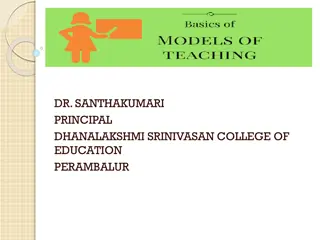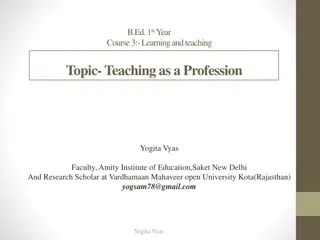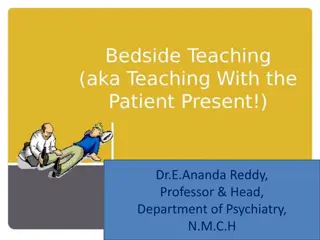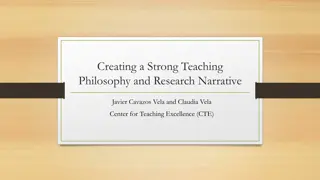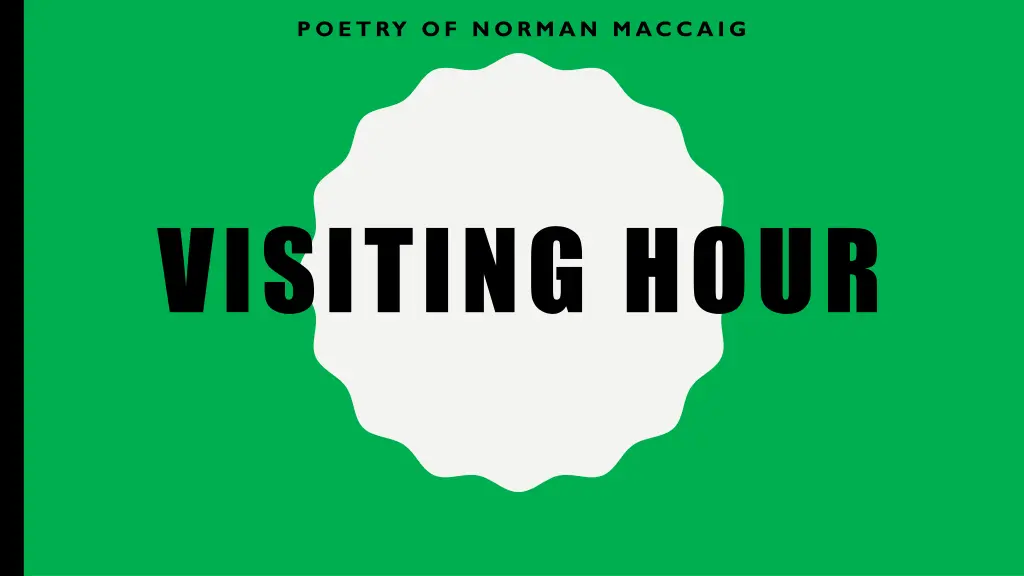
Poetry Analysis: Norman MacCaig's Visiting Hour
Explore the profound themes of death and suffering in Norman MacCaig's poem "Visiting Hour," as he reflects on a hospital visit to a seriously ill woman. The poem delves into the poet's anxieties, the futile attempts to distract from mortality, and the poignant distance caused by pain. Discover the reflective nature of the work and how MacCaig's structure mirrors his emotional journey through the hospital corridors.
Download Presentation

Please find below an Image/Link to download the presentation.
The content on the website is provided AS IS for your information and personal use only. It may not be sold, licensed, or shared on other websites without obtaining consent from the author. If you encounter any issues during the download, it is possible that the publisher has removed the file from their server.
You are allowed to download the files provided on this website for personal or commercial use, subject to the condition that they are used lawfully. All files are the property of their respective owners.
The content on the website is provided AS IS for your information and personal use only. It may not be sold, licensed, or shared on other websites without obtaining consent from the author.
E N D
Presentation Transcript
POETRY OF NORMAN MACCAIG VISITING HOUR
Poets Main Idea This poem describes a hospital visit that MacCaig makes to a seriously ill female friend or relative. He reveals the fear and anxiety that haunts him at the start of the visit He also explores the pain and suffering of the woman he is visiting and shows that they are distanced due to the pain that she is in. At the end of the poem there is a hopeless or despairing tone as he knows he can t help her in the way he would like.
Reflective Nature of the Poem In the interview A Metaphorical Way of Seeing Things , MacCaig maintained that poetry clears your eyes and you see things . MacCaig reflects throughout the poem on the ways that people try to distract themselves from death and illness and how this is futile.
Theme Reflection on death and how we try to escape it by distracting ourselves but ultimately we have to face the reality of it. Death is inevitable He also focusses on the suffering of the woman patient and how that isolates and distances her from those she loves
Structure Structure mimics his journey through the hospital Begins with him trying to distract himself from the truth of the visit and then reflecting on the illness once he is confronted by it.
Stanza One The hospital smell combs my nostrils as they go bobbing along green and yellow corridors. Think about: - What happens in this stanza? - Why do you think the poet concentrates on the smell? - What is suggested by the description of the hospital?
Establishes the setting with a universal smell something everybody will recognise and associates it with an unpleasant feeling. The word choice of hospital has connotations of life and death. Stanza One Metaphor emphasises how strong and unavoidable the smell is. Shows the speaker is uncomfortable The hospital smell combs my nostrils as they go bobbing along green and yellow corridors. Creates humorous picture he is trying to distract himself Bobbing also has connotations of lost/adrift Helps reader picture hospital These colours have connotations of sickness/illness Can t escape the fact that he is in hospital
Stanza Two What seems a corpse is trundled into a lift and vanishes heavenward. Think about: - What happens in this stanza? - What words or phrases could be shocking to the reader? - What is the effect of this image?
Stanza Two Unsure of what he sees - shows his distress and uncertainty Brutal and blunt description of a body shows finality of death and emphasises that death is in his thoughts What seems a corpse is trundled into a lift and vanishes heavenward. Disappears and doesn t come back as when someone dies concerned with the finality of death. Also has connotations of being sudden concerned about the amount of time Word is emphasised by being on a line of its own. Shows the inevitability of death Word Choice makes this seem clumsy and slow moving concerned about a lack of respect for the dead
Stanza Three I will not feel, I will not feel, until I have to. Think about: - What is the poet wanting to do in this stanza? - What emotion is the poet feeling?
Stanza Three Repetition of I shows that this is very personal to the speaker dealing with their own thoughts and feelings Repetition makes statement feel like a mantra shows his determination. He is determined to put off his feelings about what is happening I will not feel, I will not feel, until I have to. This being put on a separate line emphasises the words I have to revealing that he is aware that he can t avoid addressing his feelings he can t escape what is happening
Stanza Four Nurses walk lightly, swiftly, here and up and down and there, their slender waists miraculously carrying their burden of so much pain, so many deaths, their eyes still clear after so many farewells. Think about: - What is happening in this stanza? - How does the poet describe the nurses? - What is the poet s feeling towards the nurses?
Stanza Four Word Choice Move elegantly and with purpose admiration for the nurses Emphasises how busy the nurses are and the their skill in being everywhere they need to be The repeated use of and reinforces how impressive this is More positive admiring language used the seem attractive Nurses walk lightly, swiftly, here and up and down and there, their slender waists miraculously carrying their burden of so much pain, so many deaths, their eyes still clear after so many farewells. Shows awe at what they do they are like angels performing miracles and coping with death. Poet feels admiration but also envy because he can not do the same. Nurses don t show emotion despite the pain and suffering that they see, in contrast to the speaker who is struggling to deal with one ill person Contrast to slender Reveals weight and difficulty of what they do, their job is something to endure Lists all the things they have to cope with repetition of so highlights the sheer amount they deal with shows how difficult their job is, but they still manage Emphasises aspect speaker is struggling with saying goodbye that comes with death
Stanza Five Ward 7. She lies in a white cave of forgetfulness. A withered hand trembles on its stalk. Eyes move behind eyelids too heavy to raise. Into an arm wasted of colour a glass fang is fixed, not guzzling but giving. And between her and me distance shrinks till there is none left but the distance of pain that neither she nor I can cross. Think about: - What is happening in this stanza? - How does the poet describe the woman? - What emotion do you think the poet is feeling?
Short sentence, turning point for the poem and the speaker. Feeling of shocked by ward - he has to face his feelings Stanza Five Metaphor Bed/illness has isolated her and made her forget. Contrast to colours of before highlights her isolation Word Choice: connotations of decay and losing life Ward 7. She lies in a white cave of forgetfulness. A withered hand trembles on its stalk. Eyes move behind eyelids too heavy to raise. Into an arm wasted of colour a glass fang is fixed, not guzzling but giving. And between her and me distance shrinks till there is none left but the distance of pain that neither she nor I can cross. Metaphor sense of futility physical and emotional pain is a barrier to the speaker connecting to her, or her connecting to anyone Connotations of both weakness and fear Impersonal pronoun her body isn t her anymore, it is an empty shell. Describing body parts like non-human things (plant stalks) Emphasises illness and medication she is taking she is unable to focus on the visit Shocking imagery to describe the needle in her arm connotations of a vampire. Highlights distress and horror of poet seeing the woman in this way. Reverses the vampire image it is providing life, but the speaker is still horrified Walking to the hospital bed wanting to be close to her
Stanza Six She smiles a little at this black figure in her white cave who clumsily rises in the round swimming waves of a bell and dizzily goes off, growing fainter, not smaller, leaving behind only books that will not be read and fruitless fruits. Think about: - What is happening in this stanza? - What point of view is this stanza written in? - What is the final mood or emotion?
Repetition of cave imagery reinforces isolation. Contrast between black and white highlights their differences/ Black connotations of death, shows that the speaker is worried that she might die. His visit has brought her some comfort . It is not clear if she recognises him (he is just seen as a black figure) Stanza Six She smiles a little at this black figure in her white cave who clumsily rises in the round swimming waves of a bell and dizzily goes off, growing fainter, not smaller, leaving behind only books that will not be read and fruitless fruits. Word Choice of clumsily: He is overcome by the experiences, can barely stand afterward Vision blurs due to illness Also reinforces image if poet being clumsy due to distress he feels Bitter despair and hopelessness No one has the ability to help and so they bring gifts that are useless. He is helpless in the face of illness and death. books her story is ending, and she will not be able to see the stories of her family fruits have connotations of health and prosperity, but the paradox of fruitless fruits shows that it they cannot represent these things for her anymore
An Overview of the Stanzas Stanza One MacCaig describes the smell of the hospitals first hint at illness Stanza Two Tries to distract himself but reality of what he is doing influences what he sees Stanza Three Desperately tries to avoid any emotion Stanza Four Admires the nurses because they do what he can t Stanza Five Reality hits (turning point of the poem). Shows the pain and suffering of the woman Stanza Six End of a hopeless and pessimistic tone. He cannot help the woman
Revision Tasks To help you remember the key points of the poem you should: Write a summary of the poem showing how the poet moves from denying to facing his feelings Identify a key quote for each of the following points: A way in which the poet tries to distract himself His admiration of the nurses His shock and horror at seeing the woman The hopelessness and despair he feels. Write down and analyse any images used
Practice Question 1 Look at lines 1-7 How does the poet s use of language create a vivid description of the hospital (4)
Practice Question 2 Look at lines 7-18 Show how the poet makes it clear to the reader that the nurses have a difficult job (2)
Practice Question 3 Look at lines 19 -30 Explain how the poet uses language in order to make clear how the speaker feels upon seeing the sick woman (4)
Practice Question 4 Look at lines 31 -38 With reference to the poet s language, explain what impression we are given about the woman s health (2)




